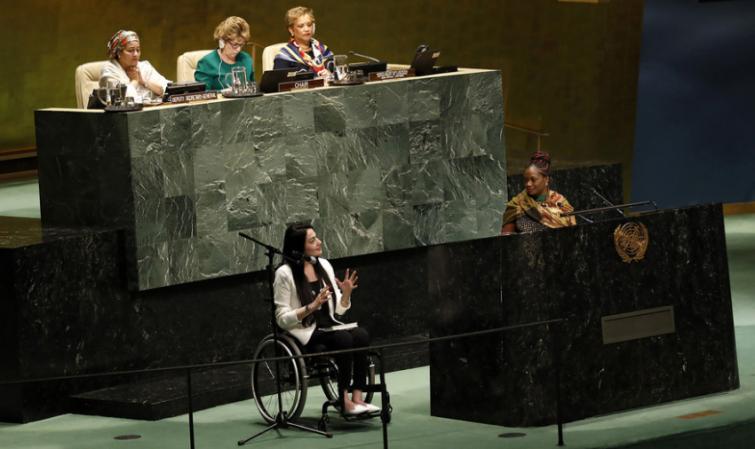
Annual UN women activists’ summit opens with focus on services, infrastructure
New York, Mar 12 (IBNS): A wheelchair-bound Pakistani mother who yearned to visit a park without worrying about ramp access, and a young South Sudanese woman who dreams of having affordable health care, were among the speakers opening the United Nation’s largest annual gathering on gender equality and women’s rights on Monday.
Addressing the 63rd session of the UN Commission on the Status of Women (CSW) in a joint speech, Muniba Mazari and Mary Fatiya, both asked for basic social protections to be extended to women and girls around the world, based on need, and in line with their inalienable human rights.
“Being a woman has its challenges. Being in a wheelchair is the cherry on top,” Mazari, who is also the Goodwill Ambassador for UN Pakistan, told several thousand activists, diplomats, and academics gathered in the UN’s General Assembly Hall.
Fatiya, who described going long distances to a school where only two toilets were available for around 600 children, said her ideal world centred around a peace existence, access to healthcare and good infrastructure: “I’m not asking for a luxurious road. I just need it and it’s my right to have it.”
The annual meeting of the Commission, which dates back to 1947, will bring more than 9,000 representatives from civil society organizations to the UN over the course of the next two weeks. This year’s theme is “social protection systems, access to public services and sustainable infrastructure for gender equality and the empowerment of all women and girls.” Many of the marathon-discussions are expected to also focus on gender equality and the 2030 Agenda for Sustainable Development.
Gender equality, 'fundamentally a question of power'
In his opening statement, Secretary-General António Guterres said the Commission on the Status of Women could equally be called the “Commission on the Status of Power”.
“Because that is the crux of the issue. Gender equality is fundamentally a question of power,” he said, noting that the world had lost its way, highlighting a pushback on women’s rights.
Guterres – who called himself a “proud feminist” – said that changing power relations, overcoming gaps and biases, and fighting to preserve gains, necessitates engaging women as equal participants in society.
“When we exclude women, everyone pays the price. When we include women, the whole world wins,” he said.
Similarly, this year’s Commission Chair, Ambassador Geraldine Byrne Nason of Ireland, said in her speech that “resilience is in women’s DNA and the world needs women’s resilience now more than ever.”
The topics that will be covered over the next two weeks, range from planning urban space and public transport, with women’s safety and mobility in mind, to improving rural women’s access to skilled birth attendants.
Invest to 'free up time', opportunity, for women and girls
The President of the Economic and Social Council (ECOSOC), Inga Rhonda King, also noted, for example, the importance of public services, infrastructure and social protection for recognizing and valuing unpaid care and domestic work – which often falls to women and girls in the family.
Investing here is “critical to free up women’s and girls’ time, support their mobility and women’s access to economic opportunities,” King said.
Highlighting some of the progress made in recent decades, the head of UN Women, Phumzile Mlambo-Ngcuka, said thanks to investment in infrastructure and access to public services, more girls are in school now than ever before.
She noted the need to close the gaps, however, saying that 71 per cent of the world’s population, still does not have full access to universal social protections.
Mlambo-Ngcuka urged greater leadership on women’s issues, saying women and girls have a vital role to play in shaping the policies delivery of services and infrastructure that impacts their lives.
Among other speakers on the opening day, was Marlène Schiappa, the French Minister of State for Gender Equality, the nation holding the Presidency of the Security Council this month. She said that the involvement of more women in political and peace processes was vital for women’s empowerment, and a problem that affects the diplomatic community. She urged the Security Council to redouble its efforts to more fully include women in these discussions.
Meanwhile, in the Security Council itself on Monday morning, where Afghanistan was top of the agenda, Storai Tapesh, Deputy Executive Director of the Afghan Women’s Network organization, raised concerns about the movement towards striking a peace deal with Taliban extremists.
“We, the women of Afghanistan, have cautious optimism for peace. Yet we are concerned – more than ever – that women’s human rights will be compromised in the name of peace.”
Support Our Journalism
We cannot do without you.. your contribution supports unbiased journalism
IBNS is not driven by any ism- not wokeism, not racism, not skewed secularism, not hyper right-wing or left liberal ideals, nor by any hardline religious beliefs or hyper nationalism. We want to serve you good old objective news, as they are. We do not judge or preach. We let people decide for themselves. We only try to present factual and well-sourced news.







